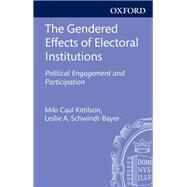The Gendered Effects of Electoral Institutions Political Engagement and Participation
, by Kittilson, Miki Caul; Schwindt-Bayer, Leslie A.- ISBN: 9780199608607 | 0199608601
- Cover: Hardcover
- Copyright: 12/14/2012
In most countries around the world, women continue to lag behind men in an array of political orientations and activities. Understanding why this is the case and why some countries have been more successful than others at moderating gender gaps in political involvement is imperative forproducing stronger and more representative democracies. Cultural, socioeconomic, and political factors explain some of the gender gaps in political involvement, but not all of them. In this book, the authors argue that electoral institutions attenuate gender gaps in mass political engagement and participation by drawing women, an 'undertapped' constituency, into the democratic process. Using cross-national and country-specific analyses, the authors show that electoralinstitutions play a complementary and significant role in reducing gender gaps in political involvement. The cross-national analyses draw on comparative survey data from a wide range and large number of countries. The case studies draw out the processes underlying changes in political attitudes andbehaviors with evidence from four country studies: New Zealand, Russia, France, and Uruguay. All four countries have altered their electoral institutions, either through large-scale reform of the electoral system itself or adopting gender quotas, allowing the authors to examine patterns of politicalinvolvement pre- and post-reform. The book finds that inclusive electoral systems that produce more proportional electoral outcomes have larger effects on women's political engagement and participation than on men's. Gender quotas also mediate women's engagement and participation, but to a lesser degree. On the whole, the bookconcludes that electoral rules designed to promote social inclusion in parliament are critical for promoting social group inclusion among the electorate.Comparative Politics is a series for students, teachers, and researchers of political science that deals with contemporary government and politics. Global in scope, books in the series are characterised by a stress on comparative analysis and strong methodological rigour. The series is published inassociation with the European Consortium for Political Research. For more information visit: www.ecprnet.eu. The Comparative Politics Series is edited by Professor David M. Farrell, School of Politics and International Relations, University College Dublin, Kenneth Carty, Professor of PoliticalScience, University of British Columbia, and Professor Dirk Berg-Schlosser, Institute of Political Science, Philipps University, Marburg.






